unit4知识讲解1
人教版七年级英语下册Unit4 要点详解1

Don ’t eat in class.要点详解1. arrive, reach, get以上三词均可表示“到达、抵达”之意,但用法不同。
arrive 后接at (小地方)或in (大地方——城市、国家)reach 直接连“某地”,get 加to 后再接某地。
如:I arrived in Beijing yesterday.They reached the Great Wall by bus.How can I get to the TV station?若要表示“到家/这儿/那儿”时,用arrive / reach / get 均可。
即:arrive / reach / get home / here / there2. in class 和in the classin class 表示“在上课”,而in the class 表示“在班上”。
Don’t talk in class.上课时不要谈话。
There are 40 students in the class.这个班有40位学生。
类似的短语还有:at table at the table in hospital in the hospital out of question out of the question in front of in the front of 在进餐在桌上(生病等)住院在医院毫无疑问不可能的在……的前面在……的前部⎧⎨⎩⎪⎧⎨⎩⎪⎧⎨⎩⎪⎧⎨⎩⎪3. have to 和mustmust 表示“必须、应该”,是从主观出发的,同时must 意味着一种“责任”与“义务”。
如:We must help our parents do some housework.have to “必须”“不得不”,常表示受外界环境、条件所迫要做的事。
如:There is nothing in the fridge. I have to go shopping now.4. else 其他的else 表示“其他的,此外”,常被置于特殊疑问句、不定代词之后。
高一英语必修一Unit4Earthquakes知识点讲解和练习

1、关系代词which用来指物,在从句中可作主语或宾语。
This is a book which tells about space rocket technology.(作主语)
The letter which I received yesterday was from my brother.(作宾语)
【归纳总结】
give out分发;发出;用完give sth.away赠送;颁发;泄露
give back归还;复原givein呈上;倒戈,屈服,认输
give off发出,放出give over停止,中止
give up放弃give on to/onto sth.朝向,面对;通向
8、Your speech was heard by a group of fivejueges,all of whom agreed that it was thebest one this year.
易混词
辨析
例句
injury
多指意外事故受伤。比hurt正式,hurt多指伤痛,而injure则指损害健康、成就、容貌等,强调功能的损失。
A bullet injured his lefgt eye.
hurt
既可指肉体上的损害,也可指精神上、感情上的损害;作不及物动词,意为“(身体某部位)难受”。指肉体上的损害时,hurt可与badly,slightly,seriously等连用,但若指精神上的创伤,只能说very much/rather/deeply hurt。
(1)n.裁判员;法官;审判员
His father used to be a judge.他的父亲过去是一名法官。
(2)v.推断;断定
Unit4Iused第一部分知识点讲解

Unit4 I used to be afraid of the darkSection A1. —Mario, you used to be short, didn’t you?马里奥,你以前个子矮,对吗?—Yes, I did. 是的。
【解析1】(1) use v.使用→useful adj. 有用的use up 用完Studying English is__________(use).(2) use sth to do sth 用某物做某事We use Internet __________(find) information.(3) used to do sth 过去常常做某事,表示过去做过的事现在已经不做,只用于过去时态。
◆变成否定句或疑问句时要借助助动词didn’t/did【拓展】(一)肯定形式:主语+used to+do…I used to get up at six.(二) 否定形式:主语+ usedn’t /didn’t use +to do …He usedn’t to study hard.= He didn’t use to study hard.(三)疑问形式:①Used +主语+ to do sth …?答语:Yes, 主语+used to./ No, 主语+ usedn’t to②Did + 主语+ use + to do ….?答语:Yes,主语+ did./ No, 主语+ didn’tUsed he to go to school on foot?= Did he use to go to school on foot?(四) 反意疑问句:肯定句+ didn’t /usedn’t+ 主语?He used to be very rich, didn’t he/ usedn’t he?否定句+ did /used +主语?He didn’t use to smoke, did /used he?①My mother used_________(tell)us story when we were young.( )②He used to ____short and ____ short hair when he was young.A. have; beB. be; haveC. be; beD. have; have【用法归纳】辨析:used to do something.,be used to do something.与be used to doing something. used to “过去常常”(后接动词不定式,表示过去的习惯)。
新人教版七年级上Unit1Unit4知识点归纳

新人教版七年级上Unit1-Unit4知识点归纳恭喜你掌握了预备篇知识点。
下面转入正式篇。
英语每个单元都安排一个日常交际用语话题,所以以后每学到一个单元,想一下是谈什么话题呢?Unit1. My name’s Gina.(一)一、这个单元是学会提问他人叫什么名字。
What’s your name?What’s his name? What’s her name? 回答:My name is …..(或I am….)(His name is …..; Her name is…….)二、学会自我介绍: My name is Gina. My name is…. 或说: I am….三、How do you do? 你好。
注意一看这个句子好像是问句,其实它不是。
它是用在两个人第一次见面时说的客套语。
回答也用How do you do?你好。
四、Nice to meet you. 遇见你很高兴。
回答也用Nice to meet you,too.(注意后面加了一个too.这个too是也的意思。
遇见你也很高兴。
)五、如果生活中老是直称呼人的名字,显得啰嗦极了。
于是英语出现了代替人的人称代词,本单元我们要掌握人称代词的主格。
(常作主语,放在谓语前面哦)I和 you你,你们 he他 she她 it它;we我们 they他们她们它们。
六、刚才在本单元第一个知识点里的my 我的;his他的 ;her她的(某某的)表属某人(物的主人)所有,英语中叫这类词物主代词。
my我的 your你的,你们的; his他的 her她的; its它的 our我们的 their他们的。
Unit1. My name’s Gina.(二)一、be的用法。
细心的同学们一定看到,很多英语句子中都有is aream.(是的意思)英语中把这几个单词称为be(是)。
be的用法由它的主语决定,请记住下面的口诀:I用am来,you用are;is用于他她它;所有复数都用are;不要乱用闹笑话。
仁爱英语七年级上册Unit4,topic1知识点讲解及随堂练习

知识点梳理(一)词汇:1.数词: 21-101 注意: A.forty.eighty; B.读音.~tee..~ty2.名词: 可数名词与不可数名词的划分3.词形变换:als.(同义词)—— too .eac.(同义词)——everykil.(复数)—— kilos . watc.(复数)—— watches mous.(复数)—— mice .expensiv.(同义词)—— dear waite.(对应词)—— waitress . tr.(第三人称单数)—— tries sel.(反义词)—— buy(二)词语与短语:1.try on 试穿2.look nice 看起来很漂亮3.bu.sth.fo.sb..bu.sb.sth.给某人买……4.sel..buy.for…以…价出售.购买5.too long太长too heavy太重6.running shoes跑鞋7.make a shopping list 列购物清单8.run over to…跑到…9.two bags of salt 两包盐two kilos of eggs 两公斤鸡蛋six bottles of milk 六瓶牛奶a bag of rice 一袋米10.pick up购买11.How many+可数复数名词;How much+不可数名词“多少”on the fourth floor 在第四层楼12.Thanks anyway = Thanks all the same. 仍然感谢。
13.Don't worry. 别担心。
(三)功能话题1.购物用语:服务员或营业员: Wha.ca..d.fo.you? Ca..Ma..Coul..hel.you?回答: Yes.please.I'.lik.(t.bu..… .wan..t.bu..…I'.lookin.for… D.yo.have…?2.谈论事物: How do you like…? = What do you think of…?How do you look in this dress? Not bad. How do the pants fit? They're too long. 询问价格:How much is +主语(单数或不可数)? How much are +主语(复数)?How much do you want for something?3.讨论价格: Ho..Wha.abou.thirt.yuan?That'.to.expensive. It'..goo.price. Th.pric.i.good.4.表示感谢: Thanks a lot. Thanks very much. Thanks anyway.回答: Not at all. That's all right. You're welcome.5.请求帮助:Could you do me a favor? = Could you do a favor for me? = Could you help me? 决定与否: I'll take / have / get / buy it.(四)易错点:1.som.常用于肯定句;any常用于否定句或疑问句。
高一英语必修一unit4知识点
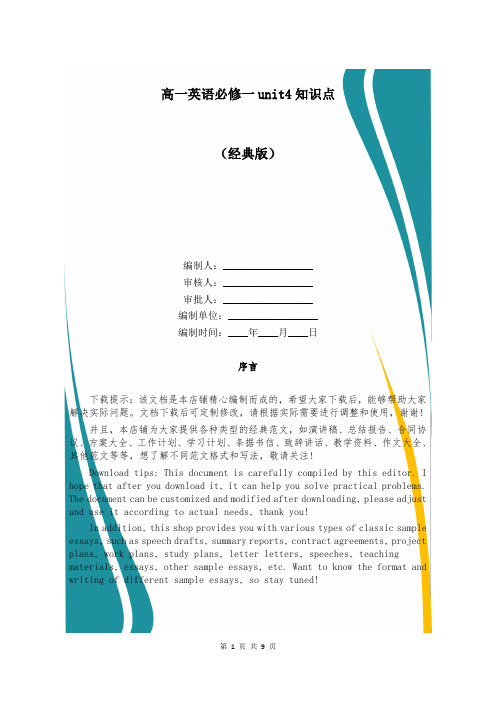
高一英语必修一unit4知识点(经典版)编制人:__________________审核人:__________________审批人:__________________编制单位:__________________编制时间:____年____月____日序言下载提示:该文档是本店铺精心编制而成的,希望大家下载后,能够帮助大家解决实际问题。
文档下载后可定制修改,请根据实际需要进行调整和使用,谢谢!并且,本店铺为大家提供各种类型的经典范文,如演讲稿、总结报告、合同协议、方案大全、工作计划、学习计划、条据书信、致辞讲话、教学资料、作文大全、其他范文等等,想了解不同范文格式和写法,敬请关注!Download tips: This document is carefully compiled by this editor. I hope that after you download it, it can help you solve practical problems. The document can be customized and modified after downloading, please adjust and use it according to actual needs, thank you!In addition, this shop provides you with various types of classic sample essays, such as speech drafts, summary reports, contract agreements, project plans, work plans, study plans, letter letters, speeches, teaching materials, essays, other sample essays, etc. Want to know the format and writing of different sample essays, so stay tuned!高一英语必修一unit4知识点知识能够被获得,并且因为它的本质,知识总是局部的,它永远都不是完整的,所以,一切源于知识的行动也都是局部的、不完整的。
人教版七年级英语上册unit 4 句子讲解及知识点梳理
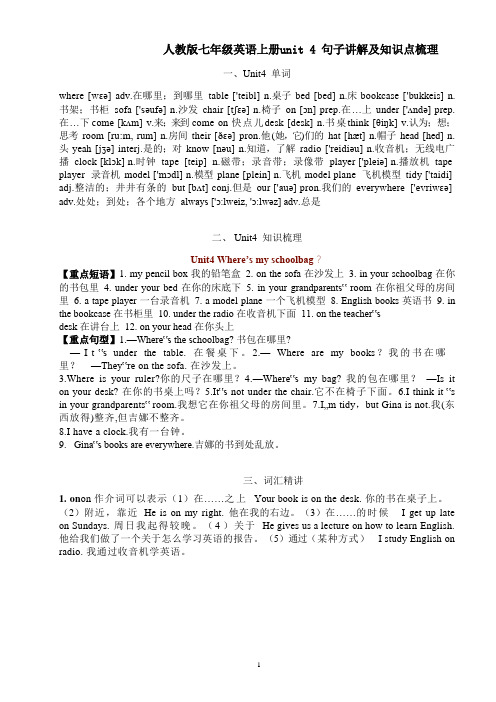
人教版七年级英语上册unit 4 句子讲解及知识点梳理一、Unit4 单词where [wɛə] adv.在哪里;到哪里table ['teibl] n.桌子bed [bed] n.床bookcase ['bukkeis] n. 书架;书柜sofa ['səufə] n.沙发chair [tʃɛə] n.椅子on [ɔn] prep.在…上under ['ʌndə] prep. 在…下come [kʌm] v.来;来到come on 快点儿desk [desk] n.书桌think [θiŋk] v.认为;想;思考room [ru:m, rum] n.房间their [ðɛə] pron.他(她,它)们的hat [hæt] n.帽子head [hed] n. 头yeah [jʒə] interj.是的;对know [nəu] n.知道,了解radio ['reidiəu] n.收音机;无线电广播clock [klɔk] n.时钟tape [teip] n.磁带;录音带;录像带player ['pleiə] n.播放机tape player 录音机model ['mɔdl] n.模型plane [plein] n.飞机model plane 飞机模型tidy ['taidi] adj.整洁的;井井有条的but [bʌt] conj.但是our ['auə] pron.我们的everywhere ['evriwɛə] adv.处处;到处;各个地方always ['ɔ:lweiz, 'ɔ:lwəz] adv.总是二、 Unit4 知识梳理Unit4 Where’s my schoolbag?【重点短语】1. my pencil box 我的铅笔盒 2. on the sofa 在沙发上 3. in your schoolbag 在你的书包里4. under your bed 在你的床底下 5. in your grandparents‟ room 在你祖父母的房间里 6. a tape player 一台录音机7. a model plane 一个飞机模型8. English books 英语书9. in the bookcase 在书柜里10. under the radio 在收音机下面11. on the teacher‟sdesk 在讲台上12. on your head 在你头上【重点句型】1.—Where‟s the schoolbag? 书包在哪里?—I t ‟s under the table. 在餐桌下。
人教版英语九年级上册Unit4知识点梳理及语法讲解
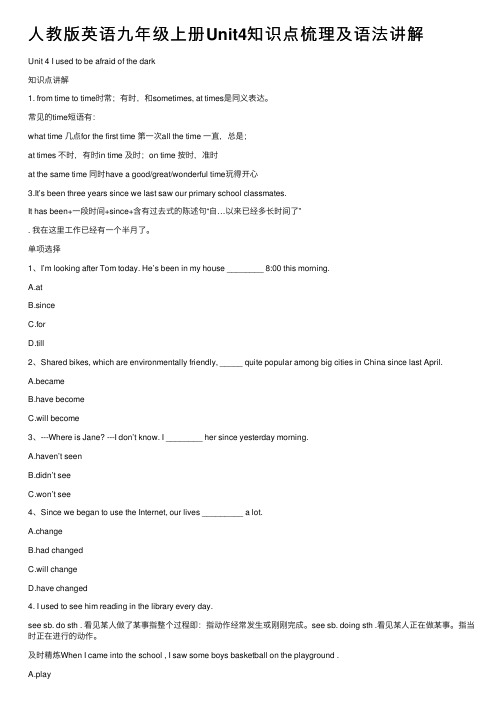
⼈教版英语九年级上册Unit4知识点梳理及语法讲解Unit 4 I used to be afraid of the dark知识点讲解1. from time to time时常;有时,和sometimes, at times是同义表达。
常见的time短语有:what time ⼏点for the first time 第⼀次all the time ⼀直,总是;at times 不时,有时in time 及时;on time 按时,准时at the same time 同时have a good/great/wonderful time玩得开⼼3.It’s been three years since we last saw our primary school classmates.It has been+⼀段时间+since+含有过去式的陈述句“⾃…以来已经多长时间了”. 我在这⾥⼯作已经有⼀个半⽉了。
单项选择1、I’m looking after Tom today. He’s been in my house ________ 8:00 this morning.A.atB.sinceC.forD.till2、Shared bikes, which are environmentally friendly, _____ quite popular among big cities in China since last April.A.becameB.have becomeC.will become3、---Where is Jane? ---I don’t know. I ________ her since yesterday morning.A.haven’t seenB.didn’t seeC.won’t see4、Since we began to use the Internet, our lives _________ a lot.A.changeB.had changedC.will changeD.have changed4. I used to see him reading in the library every day.see sb. do sth . 看见某⼈做了某事指整个过程即:指动作经常发⽣或刚刚完成。
初中英语人教版九全Unit 4 Section A 单元知识讲解
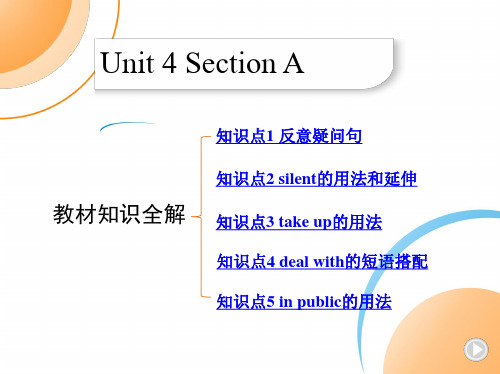
知识点 4 deal with的短语搭配
例4 (2022湖北黄冈期中改编)根据汉语意思完成句子。每
空一词
为了消除怒气,她开始唱歌。 She began singing to deal with her anger.
知识点 5 in public的用法
教材原文 giving a speech in public 公开发表演讲 in public意为“公开地;当众”。 I get nervous when I speak in public. 我当众讲话时觉得很紧张。
B.take up
C.put up
D.clean up
知识点 3 take up的用法
解:四个选项的含义分别是:turn up开大,调高(音量等);take
up占用,学着做;put up举起,搭建,张贴;clean up打扫干净。根据 本题语境可知,我打算学着做饭,因为我必须独自生活,take up 符合题意。
知识点 2 silent的用法和延伸
词汇联想 短语:keep silent 保持沉默 派生词:silently adv. 默默地;无声地 silence n. 沉默;无声(in silence沉默地;无声地)
知识点 2 silent的用法和延伸
例2 (2021安徽合肥瑶海区十二月段考)根据句意和首字母
可知,附加问句中要用didn't,故答案为C。
知识点 2 silent的用法和延伸
教材原文 She was always silent in class.她在课堂上总是很 沉默。 silent是形容词,意为“不说话的;沉默的”。 He was silent for a moment, and then began his answer.他沉默 了一会儿,然后开始了他的回答。
Unit4知识点讲解课件人教版八年级英语下册

● —Right. 5G willan ever.
● A. download
B. downloads C. to download D. downloading
● 2. Jenny is afraid to travel by plane. She always feels it.
●
●municate ●考点:① v.交流;沟通 ● ② communication n.交流;沟通 ●搭配: ●communicate with sb与某人交流 ●=have a communication with sb
●3.elder
●考点:① adj.年级较长的
●
② old--elder-eldest
B. because
C. or
D. so that
● 4. —How will she deal with the work?
● —She doesn't want to do it by herself. She wants to ask someone else to do it, .
● A. yet
B. instead C. too
D. either
● (一)单项选择
● 5. Lucy drank sleepy.
coffee so she couldn't sleep well last night. Today she feels
● A. too much; much too B. too much; too much
人教版英语八年级下册
Unit 4 Why don’t you talk to your parents? 知识点详解
By Nancy
七上英语unti4知识点

七上英语unti4知识点
Unit 4的知识点包括但不限于:
1. 词汇:包括名词(如backpack、book、pencil等)、形容词(如old、new、big等)、动词(如have、need、find等)和介词(如in、on、under等)。
2. 语法:一般现在时的使用,包括主语+动词原形的结构,以及疑问句和肯定句的变换。
指示代词this和that的使用也是重要的知识点。
3. 物品位置的描述:可以使用where引导的疑问句来询问物品的位置,以
及介词on表示物品在某物的上面。
4. 动词的用法:take表示从近处带到远处,而bring表示从远处带到近处。
5. some和any的使用:some一般用于肯定句,any用于否定句和疑问句。
在表示请求、建议、征求意见等委婉语气的疑问句中,用some而不用any。
6. 名词所有格:在英语中,表达“我的”、“你的”、“他的”时,可以使用代词my、your、his等。
7. 其他语法点:比如指示代词these和those的使用。
this用于指离说话
者近的人、物,that用于指离说话者远的人、物;同时,在表达“我的”、“你的”、“他的”时,也可以使用名词所有格形式,如my backpack、your book、his pencil等。
以上内容仅供参考,建议查阅七年级英语课本或咨询英语老师,获取更准确的信息。
人教版英语九年级Unit 4 重点知识归纳讲解

Unit 4 I used to be afraid of the dark. 知识清单Section A一、重要短语:1. 几天a couple of days2. 在课堂上保持沉默be silent in class3. 在游泳队on the swim team4. 过去很幽默used to be humorous5. 回答问题不够大胆be not brave enough to answer questions6. 对运动更感兴趣be more interested in sports7. 不时,有时from time to time8. 一些给年轻人的建议some advice to young people9. 在他考试中获得高分get good scores on his exam(s)10. 采访一个18岁的亚洲名星interview an 18-year-old Asian pop star11. 吸引无数目光get tons of attention12.有很多个人时间have much private time13. 我身边的警卫guards around me14. 放弃正常生活give up normal life15. 通向成功的路the road to success16. 害怕孤独be afraid of being alone17. 需要很多才能和艰苦的工作获得成功need a lot of talent and hard work to succeed18. 在大庭广众下演讲give a speech in public19. 读关于欧洲历史和非洲文化的书read books on European history and African culture20. 教我们英式英语teach us British English21. 到达成功的顶峰make it to the top二. 知识讲解Section A1. Mario used to be short. He used to wear glasses. 玛里奥过去个子矮。
Unit4重难知识点(复习讲义)-六年级英语上册单元速记巧练(人教PEP版)

Unit 4 I have a pen pal重难点讲解(含答案)一、重难点讲解1.询问某人是否喜欢做某事【句型结构】问句:Do/Does+主语+like+动词ing+其他?肯定回答:Yes, 主语+do/does.否定回答:No, 主语+don’t/doesn’t.【解析】本句是一个由dos开头的一般疑问句,因为句中的主语he是第三人称单数,所以助动词do要用第三人称单数形式does。
例如:—Does he like doing word puzzles and going hiking?他喜欢猜字谜和远足吗?—Yes, he does. 是的,他喜欢。
2.询问“某人的爱好”的问句及其答语【句型结构】问句:What are+某人的+hobbies?答语:主语+like(s)+动词ing形式(+其他).答语用于表达“喜欢做某事”,这是一个一般现在时态的句子。
由于主语是he,所以谓语动词like需要用第三人称单数形式。
3.特殊疑问词What、Where、When✧What+be动词+某人+goingto do(+时间或地点)?某人打算去做什么✧When+be动词+某人+going(+地点)?某人打算什么时候去✧Where +be动词+某人+going(+时间)?某人打算去哪里?【考题精练】A.flyB. fliesC. flying()2. —What is Mike’s hobby?—_____________.A.He is swimmingB.He is going to the cinema.C.He likes reading stories and going hiking.()3. —What do you do _______Sundays?—I often watch TV..A. inB. onC. at()4. I want ______that song.A.learnB. to learnC. learning ()5. This is my pen pal _______ Canada.A.onB. withC. from()6. His hobbies ______reading and swimming.A.isB. areC. like()7. Do you want to________ us?A.joiningB. joinsC. join()8. I write an email ______ Mike every month.A.fromB. toC. at()9. —Does your aunt ________ books?—Yes, she does.A.likes readingB. like readC. like reading ()10. He lives in Canada, ______he speaks Chinese.A.butB. orC. so()11. Usually my mother ______ the dishes after dinner.A.doB. doingC. doesA.goB. to goC. going()13. How many ______ do you have?A.hobbyB. hobbysC. hobbiesA.studyB. studiesC. studying ()15. I’m writing _____ email to my new pen pal.A.aB. an C the三、看图完成句子1. Andy likes .2. Mike goes to school .3. Amy loves to .4. John’s mother likes in the morning.四、根据汉语意思完成句子。
新版英语八年级上册第四单元知识点归纳1

Unit4 What’s the best movie theater一、短语归纳movie theater电影院come true实现;达到clothes store服装店so far到目前为止talent show才艺表演take…seriously仔细对待in common共同;共有around the world世界各地;全世界in town在镇上more and more……越来越…… and so on等等all kinds of……各种各样的make up编造(故事, 谎言等)not everybody并不是每个人close to…离……近cheap—cheaper cheaply—more cheaply loudly —more loudly boring – more boringcarefully – more carefully fresh – freshest二, 知识点归纳1.pla..rol.in…在……方面发挥作用/有影.pla..rol.i.doin.sth.发挥做某事的作用2.fo.example例.后直接加例子(同类事物中的一个例子)such as 后加逗点在加例子(多个例子)3.giv.sb.sth.给某人某.. giv.st.t.sb.把某物给某人4.sho.s.st.展示某人某. sho.st.t.sb..把某物展示给某.5.Thank.fo.doin.sth.因做某事而感谢。
6.b.u.to是……的职责;由……确.(to为介词)b.u.t.sb.t.d.sth.由某人确定去做某.7.watc.sb.d.sth.观看某人做某事8.on.of+可数名词的复.……之一one of + the adj最高级+ 名词复数最……的……之一9.fee.lik. finis..kee..enjo. practic. hav.fu.后接动词接doing的形式三, 句子1.It's the closest to home.它离家最近。
小学英语人教新起点版四年级上册Unit 4课文+单词+知识点讲解(含视频和音频,可下载)
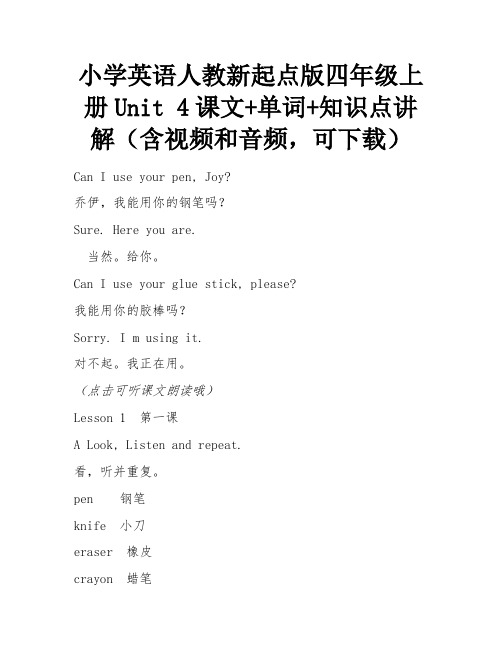
小学英语人教新起点版四年级上册Unit 4课文+单词+知识点讲解(含视频和音频,可下载)Can I use your pen, Joy?乔伊,我能用你的钢笔吗?Sure. Here you are.当然。
给你。
Can I use your glue stick, please?我能用你的胶棒吗?Sorry. I m using it.对不起。
我正在用。
(点击可听课文朗读哦)Lesson 1 第一课A Look, Listen and repeat.看,听并重复。
pen 钢笔knife 小刀eraser 橡皮crayon 蜡笔scissors 剪刀glue stick 胶棒paper 纸Bill, Lily and Joy go to the supermarket.比尔、丽丽和乔伊去超市。
I need a knife and some pens.我需要一把刀和一些钢笔。
I need an eraser, a glue stick and somepaper. 我需要一块橡皮、一根胶棒和一些纸。
I need some crayons and a pair of scissors.我需要一些蜡笔和一把剪刀。
Do you have scissors?你有剪刀吗?Sure, here you are.当然,给你。
B Let s role-play.一起角色扮演吧。
Do you have erasers?你们有橡皮吗?Yes, we do.是的,我们有。
Do you have crayons?你们有蜡笔吗?Sorry, we don t.对不起,我们没有。
(点击可听课文朗读哦)Lesson 2 第二课A Look, listen and repeat.看,听并重复。
Bill: Hi, Andy. Can I use your glue stick, please?你好,安迪。
我能用你的胶棒吗?Andy: Sorry. I m using it.对不起。
Unit4知识点讲解及练习牛津译林版英语九年级上学期

9A Unit4 Growing up知识点梳理词性转换lead领导(v./n.)→leader领导者(n.)simple简单的(adj.)→simply简单地,仅仅(adv.)nation国家,民族(n.)→national国家的(adj.)success成功(n.)→successful成功的(adj.) successfully成功地(adv.) succeed成功(vi.)achieve实现,达成(vt.)→achievement成就(n.)survive幸存(vt.)→survivor幸存者(n.)usual寻常的(adj.)→unusual不同寻常的(adj.)die死亡(vi.)→dead死亡的(adj.) dying临死的(adj.) death死亡(n.)短语、句型归纳1.What’s on your mind? 你有什么心事?on one’s mind 挂在心上,惦念in one’s mind 在某人看来make up one’s mind 下定决心change one’s mind 改变主意2. Growing up is hard! 长大真难啊!3. What’s up?=What’s the matter?=What’s wrong? 怎么了?4. build another one for yourself 为你自己建造另一个(房屋)build sth. for sb. 为某人建造某物5.Don’t wake me up until you finish building it. 直到你造完(房屋)再叫醒我。
finish doing sth. 完成做某事6. allow me to learn about people in different times and places使我能了解不同时期和地方的人allow doing sth. 允许做某事7. read them whenever I want to 无论何时我想读就读他们8. learn about the world through the Internet 通过因特网了解世界9. As soon as you click t he mouse, there’s a great deal of information.你一点击鼠标,就会有大量信息。
人教版九年全一册Unit4 I used to be afraid 知识点总结(含短语句型精讲作文)
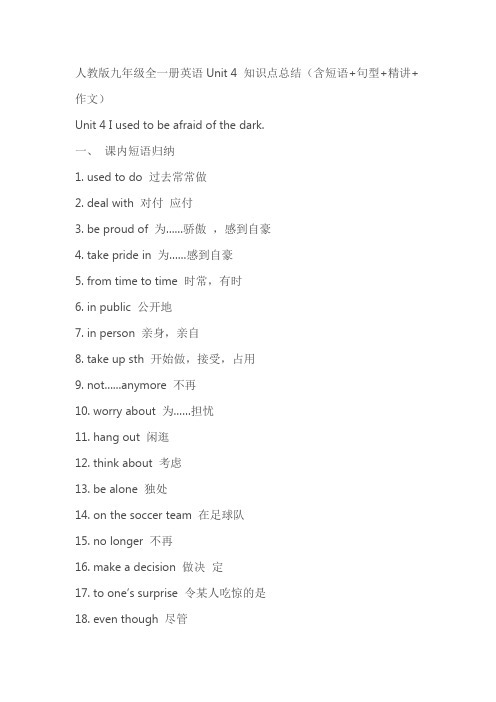
人教版九年级全一册英语Unit 4 知识点总结(含短语+句型+精讲+作文)Unit 4 I used to be afraid of the dark.一、课内短语归纳1. used to do 过去常常做2. deal with 对付应付3. be proud of 为……骄傲,感到自豪4. take pride in 为……感到自豪5. from time to time 时常,有时6. in public 公开地7. in person 亲身,亲自8. take up sth 开始做,接受,占用9. not……anymore 不再10. worry about 为……担忧11. hang out 闲逛12. think about 考虑13. be alone 独处14. on the soccer team 在足球队15. no longer 不再16. make a decision 做决定17. to one’s surprise 令某人吃惊的是18. even though 尽管19. pay attention to 对……注意,留心20. in the last few years 在过去的几年里21. be afraid of 害怕22. turn red 变红23. tons of attention 很多关注24. be careful 当心25. give up 放弃26. a very small number of …极少数的……27. give a speech 作演讲28. all the time 一直总是29. be interested in 对……感兴趣30. change one’s li fe 改变某人的生活31. take care of 照顾32. one of… ……之一二、重点词汇解析1. silentsilent是形容词,意为“沉默的;无言的”,其名词形式为silence。
人教版七年上册Unit4My Favourite Subject知识点总结(含短语句型精讲作文)

新人教版七年级上册英语Unit 4知识点总结(含短语+句型+精讲+作文)Unit 4 My Favourite Subject一、短语归纳1. the importance of ……..的重要性2. favourite subject 最喜欢的学科3. wake up 醒来4. be late for 迟到5. come on 快点6. next class 下一节课7. learn about 了解;学习;知道8. be good with 灵巧的;善于应付…的9. help sb with 帮助某人做(某事)10. look at sth 看某物11. let sb do sth 让:果人做某事12. listen to 听;倾听13. be good at 擅长14. walk to school 步行去卜:学15. work hard 努力工作16. make sb /sth+adj. 计果人/物17. make sb do sth 让某人做果事18. on that day 在那天19. the same as 与……一样20. all kinds of 各种各样的21. want to be 想要成为22. in the future 将来;未来23. work out 计算出;解决24. in class 课堂上25. feel like 感觉像26. in one's life 在某人的生活中二、必背重点句型1. 谈论最喜欢的学科:——What's your favourite subject?你最喜欢的学科是什么?——My favourite subject is English.我最喜欢的学科是英语。
2. 询问原因并给出理由:-——Why do you like it?你为什么喜欢它?——It's interesting to learn about the past. 了解过去是有趣的。
七下英语Unit4重点知识 (1)
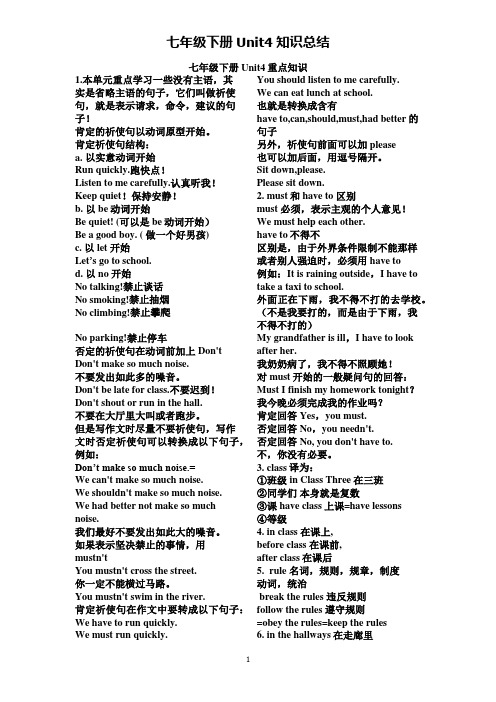
七年级下册Unit4重点知识1.本单元重点学习一些没有主语,其实是省略主语的句子,它们叫做祈使句,就是表示请求,命令,建议的句子!肯定的祈使句以动词原型开始。
肯定祈使句结构:a.以实意动词开始Run quickly.跑快点!Listen to me carefully.认真听我!Keep quiet!保持安静!b. 以be动词开始Be quiet! (可以是be动词开始)Be a good boy. ( 做一个好男孩)c. 以let 开始Let’s go to school.d. 以no 开始No talking!禁止谈话No smoking!禁止抽烟No climbing!禁止攀爬No parking!禁止停车否定的祈使句在动词前加上Don'tDon't make so much noise.不要发出如此多的噪音。
Don't be late for class.不要迟到!Don't shout or run in the hall.不要在大厅里大叫或者跑步。
但是写作文时尽量不要祈使句,写作文时否定祈使句可以转换成以下句子,例如:Don’t make so much noise.=We can't make so much noise.We shouldn't make so much noise.We had better not make so much noise.我们最好不要发出如此大的噪音。
如果表示坚决禁止的事情,用mustn'tYou mustn't cross the street.你一定不能横过马路。
You mustn't swim in the river.肯定祈使句在作文中要转成以下句子:We have to run quickly.We must run quickly. You should listen to me carefully.We can eat lunch at school.也就是转换成含有have to,can,should,must,had better的句子另外,祈使句前面可以加please也可以加后面,用逗号隔开。
- 1、下载文档前请自行甄别文档内容的完整性,平台不提供额外的编辑、内容补充、找答案等附加服务。
- 2、"仅部分预览"的文档,不可在线预览部分如存在完整性等问题,可反馈申请退款(可完整预览的文档不适用该条件!)。
- 3、如文档侵犯您的权益,请联系客服反馈,我们会尽快为您处理(人工客服工作时间:9:00-18:30)。
去上学去上班起床通常到达旅馆夜晚听上床睡觉工作家庭作业大约告诉,讲述希望,祝愿调查,考察学科,科目科学科学家科学的因为描述字,词,话伙伴,合作者城市生物学忙的,繁忙的,忙碌的严格的,严厉的疲倦的,累的在附近,到处在。
之前业余爱好生活在。
之后(一)基本单词1.____________ n.损失;遗失;丧2.____________ vt.& vi.打猎;猎取;搜寻3.____________ n.减轻或解除;减轻痛苦的事物4.____________ n.仁慈;宽恕;怜悯5.____________ adj.确定的;某一;一定6.____________ vt.包含;容纳;容忍7.____________ vt.影响;感动;侵袭8.____________ n.& vt.损害;危害9. 保护10.减少11.损失12.重要(性)13.鉴赏,感激;意识到14.成功15.安全的,可靠的16.凶猛的,猛烈的17.强大的,有力的18.笑,小声(二)派生单词19.____________ vt.& vi.减少;(使)变小;或变少→____________vt.增加20.____________ vi.回答;响应;做出反应→____________n.回答;响应21.____________ vi.成功vt.接替;继任→____________n.成功→____________adj.成功的22.____________ vt.雇用;利用→____________n.利用;雇用→____________ n.雇员→____________n.雇主23.loss n.损失,遗失丧失v.失去;遗失adj.失去的,不知所措失败者n.24.仁慈的,宽容的adj. n._______________Ⅱ.短语回顾(一)根据汉语提示补全下列短语1.灭亡;逐渐消失die________2.和平地;和睦地;安祥地________peace3.在危险中;垂危________danger4.如释重负;松了口气________relief5.保护……不受……(危害)protect________6.注意pay attention________7.形成;产生come________being8.按照;根据……所说according________(二)用上述短语的适当形式填空9.The law made for workers has helped out many peasantworkers since it ______________. 10.We should ____________ forming good habits of reading carefully.11.May God ____________ you ____________harm!12.They live ____________ in that old village.13.Many rare animals are ____________.Ⅲ.佳句仿练1.We used to be an endangered species.(used to do sth.过去常常做某事,暗示现在已经不再我过去常常在业余时间打篮球,但现在我对足球感兴趣了。
→____________________,but now I am interested in football.2.It shows the importance of wildlife protection,but I'd like to help as the WWF suggests.(as 引导方式状语从句,意为“按照……;像……那样”。
)依我看来,这工作不像你想象的那么简单。
In my opinion,the work is not so easy3.But what an experience!(此句为what引导的感叹句的省略。
)多么了不起的一个中国人啊!→________________________________________________________________________ 4.They lived on the earth tens of millions of years ago,long before humans came into being...(long before很久以前,before后边可以跟从句。
)早在我来这儿以前我就听说过他的情况。
→I heard of him_____________________________.重点单词1.relief n.(痛苦或忧虑的)减轻或解除;减轻痛苦的事物;救济;救援物品①in relief 如释重负;松了口气②(much) to one's relief 使某人放心(宽慰)的是③feel a sense of relief 如释重负写出下列句子中relief的含义(1)Much to my relief,my son was eventually admitted to the famous university.(2)The pills gave him some relief for the moment.____________(3)The floodstricken area is in desperate need of food and medicine relief.____________ 2.affect vt.影响;感动;侵袭We were all deeply affected by the news of her death.她去世的消息使我们深感悲痛。
(朗文)Their opinion will not affect our decision.他们的意见将不会影响我们的决定。
This area was affected by the hurricane last night.这个地区昨天晚上被台风侵袭①be greatly affected很受感动②have an effect on/upon...对……有影响affect只能用作动词,除了“影响”之意,还可以引申为“感动,感染”;而effect用作名词,着重影响的结果,多用于短语have an effect on,意为“影响”用affect/effect的适当形式填空(1)Staying up too late will have a bad ________ on your health.(2)The boy was absorbed in reading without being ________ by the noise outside. 3.appreciate v.鉴赏;感激;意识到Y ou should pay more attention to the rainforest where I live and appreciate how the animals live together.(P26)你应该多关注我生活的热带雨林,并且懂得热带雨林的动物是如何在一起生活的。
His talent for music was not appreciated.他的音乐才能无人赏识。
I would appreciate it if you could turn the radio down.如果你能将收音机音量调小些,我会不胜感激。
①appreciate后面接名词或动名词作宾语②appreciate sth.欣赏某物;感激某事③appreciate doing sth.感谢做某事④appreciate one's doing sth.感谢某人做某事⑤I would appreciate it if...如果……,我将不胜感激。
写出下列句子中appreciate的词义(1)His talents are greatly appreciated by the boss.____________(2)I would appreciate hearing from you.____________(3)We didn't appreciate that he was badly ill.____________4.succeed vi.成功;继承vt.接替;继任What must be done if wildlife protection is to succeed? (P27)如果野生动物保护计划要想成功的话必须要做什么?The two mountain climbers succeeded in reaching the peak.两名登山者成功地到达了山顶。
Finally he succeeded his father as the general manager of the company.最后他接替父亲,成为公司总经理。
①succeed (in) doing sth.成功……②success n.[U]成功;成就[C]成功的人或事物③successful adj.成功的④successfully adv.成功地【即时应用】选用上述词汇完成下列情景T o tell the truth,I used not to be a (1)________ in communicating with others.But later I went to a night school and (2)________ learning some social skills.Then I was (3)________ in making friends with many young people.Actually it's not difficult to (4)________ improving yourself.5.employ vt.雇用;利用(时间、精力等)Can they be employed to work in the park and not hurt the animals? (P27)可以雇用他们在公园里干活而不伤害动物吗?The report examines teaching methods employed in the classroom.这个报告考查了课堂上用的教学方法。
The children were employed in building sandcastles.孩子们忙着堆沙堡。
